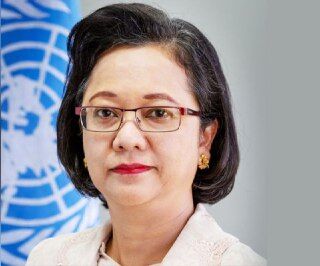
The tragic loss of life and the destruction wrought by recent flooding in the Islamic Republic of Iran is a reminder of the threat to lives, livelihoods and societies posed by extreme weather events, she wrote.
The floods which swept across the Islamic Republic of Iran in spring this year were devastating. They affected 10 million people and 500,000 people were displaced of which half were children. Hospitals and schools were destroyed, denying 100,000 children and education and thousands access to basic health care. Large sections of the country’s road network were affected, which will weigh on the economy, but also impact on many families’ daily lives. Damages have been estimated at $ 4.7 billion, a third of which concern the agricultural sector, critical to many livelihoods.
Yet as tragic and costly as the recent floods have been, they are also part of a wider phenomenon: the increasing risk of natural disasters outpacing resilience in the Islamic Republic of Iran and in Asia and the Pacific. Sand and dust storms, drought, desertification and wind erosion are all expected to rise in South-West Asia by 2030. Intensified by climate change, these disasters are becoming increasingly frequent. They hit the poor and vulnerable hardest, particularly in informal settlements. Some of Iran’s least developed provinces have suffered the most, with successive sand and dust storms destroying crops and infrastructure, and undermining people’s health, study and work.
These challenges exemplify why economic, social and environmental considerations must be considered together, if we are to effectively mitigate the consequences of natural disasters and achieve sustainable development. Evidence from across the globe tells us ignoring the social impact of economic growth can place a huge strain on societies, and at its worst lead to instability and conflict. Ignoring the environmental cost of economic growth in many parts of our region has led to climate change and an increased risk of natural hazards, which entrench poverty and perpetuate inequality. Nowhere is an integrated, multilateral response needed more than in Asia and the Pacific, the most disaster-prone region in the world.
With this in mind, the United Nations Economic and Social Commission for Asia and the Pacific (ESCAP) has worked with the Islamic Republic of Iran to establish the Asian and the Pacific Center for the Development of Disaster Information Management (APDIM) in Tehran. It will deliver targeted capacity development for disaster information management and knowledge sharing. A regional cooperation mechanism for combating the sand and dust storms has already been adopted. This will work to reduce the causes of risk of multiple hazards, develop a sand and dust storms alert system and tap regional partnership networks to enhance technical support where it is most needed.
My ambition is for APDIM to fit into a broader regional development and cooperation effort. One to reduce the inequality and environmental degradation which have accompanied recent exponential economic growth in our region. Our analysis shows the investment needed to achieve sustainable development in Asia and the Pacific is within reach. Developing countries’ investment needs stand at an additional $ 1.5 trillion per year, or five percent of their combined GDP. In the Islamic Republic of Iran, we estimate investments needed to climate-proof basic infrastructure are equivalent to roughly 1 percent of Iran’s GDP in 2018. Further investment would be required in education and people centered approaches to build resilient communities and economy.
Sustainable development which balances economic growth with the need for social inclusion and environmental protection is essential to ensure a prosperous Iran today and a clean, compassionate and safe future for our children. Investing in people, as well as investing in skies, land and water can ensure that future. The Islamic Republic Iran has the means and the will. Yet persistence will be required to achieve this ambition, and the United Nations family stands ready to assist in any way it can in the months and years ahead.
* Armida Salsiah Alisjahbana is the Under-Secretary-General of the United Nations and Executive Secretary of Economic and Social Commission for Asia and the Pacific (ESCAP)
9156**1430
Follow us on Twitter @IrnaEnglish
IRNA English solhkhabar | Peace International News Agency Peace International News Agency , Peace News , International Agency News of Peace
solhkhabar | Peace International News Agency Peace International News Agency , Peace News , International Agency News of Peace